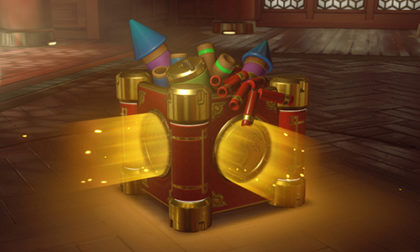U.S. Senator Seeks to Ban Loot Boxes from Youth-Targeted Video Games
The video game industry continues to sit under the microscope for its employ of loot boxes or similar mechanics in many games. Now, United States Senator Josh Hawley (R – Missouri) has announced that he will introduce a bill to ban loot boxes and other forms of monetization from video games whose target market is children.
In a press release issued Wednesday, Sen. Hawley said:
Social media and video games prey on user addiction, siphoning our kids’ attention from the real world and extracting profits from fostering compulsive habits. No matter this business model’s advantages to the tech industry, one thing is clear: there is no excuse for exploiting children through such practices.
When a game is designed for kids, game developers shouldn’t be allowed to monetize addiction. And when kids play games designed for adults, they should be walled off from compulsive microtransactions. Game developers who knowingly exploit children should face legal consequences.
The Loot Box Controversy

Sen. Josh Hawley
Photo credit: hawley.senate.gov
I know loot boxes are a video-game thing, but I occasionally write about them here because of their link to gambling. Loot boxes are rewards given in some video games that contain random items for the player. In most games that use them, the loot boxes can be earned through regular play (for instance, but earning experience points and “leveling up”), but they can usually be purchased with real money, as well.*
In some games, such as the very popular Overwatch, loot box contents only serve cosmetic or entertainment purposes and give the player no advantage at all. For instance, a special event just ended in Overwatch and I played most days in order to grind loot boxes so that I might get one of the limited-time “skins” for some of the characters. These costumes are purely for looks.
In other games, though, loot box contents can also contain special weapons, weapon add-ons, or power-ups that can give players an in-game advantage or allow a player to advance more quickly in the game. That is typically where most of the complaints come in, that the temptation to buy these loot boxes is too tempting, especially when a player is having trouble beating opponents who have paid for all the best stuff.
The gambling part of it is that, as mentioned, the items in the loot boxes are randomized, so there is no guarantee you will get what you want. Some games just let you purchase items straight away (which I don’t like), but games with loot boxes let you buy the boxes and then it’s essentially like pulling the arm on a slot machine. Unlike a slot machine, you always get something (which is the argument against loot box mechanics being gambling), but most of the time, what you get isn’t necessarily all that useful or desired.
An avid gamer myself, I consider loot boxes to be gambling, though I don’t really have anything against the Overwatch types that offer only cosmetic items.
What Would the Upcoming Bill Do?
What Sen. Hawley wants to do is ban loot boxes as well as other, direct in-game purchases in games either targeted towards kids or that are known to be played by children, even if they aren’t specifically geared toward them. Games targeted to children under 18 would be “….determined by subject matter, visual content, and other indicators similar to those used to determine applicability of the Children’s Online Privacy Protection Act (COPPA).”
As for enforcement:
These rules would be enforced by the Federal Trade Commission, which would treat the distribution of such games by publishers and online distributors as an unfair trade practice.
State attorneys general would also be empowered to file suit to defend the residents of their states.
As a gamer and a father of two kids who are playing Minecraft together as I type this, I can understand Sen. Hawley’s goal here – I don’t want my kids to spend money in-game for a random chance at stupid costumes or feel like they need to pay extra money to be able to keep up, especially after I already spent money on the game. But still don’t like the upcoming legislation.
While I think it sucks for game developers to have pay-to-win structures built into their games, nobody is being forced to make in-game purchases. I am one hundred percent for regulation in all sorts of industries, but I feel that this is something that can essentially self-regulate. If customers don’t like in-game purchases or loot boxes, they won’t buy them and developers will have to figure out other things to do. Plus, micro-transactions do help the game companies make money, enabling them to put out new games and keep prices lower (or free in some cases). It’s a different time than when I was a kid and you just bought an Atari or Nintendo game and that was it. You had what you had. Today, there is an expectation that game companies will keep putting out new content for one game for years; they need money to do that.
And again, as a father of two gamers, I have made sure to teach them about in-game purchases and explain what they are allowed and not allowed to do. Fortunately, they have been very good about obeying my rules. Most games and platforms also include parental locks on payment, require some sort of password/smartphone app confirmation, or allow you to simply not store a payment method in order to prevent intentional or accidental purchases. It’s not that hard to keep kids from spending their parents money on loot boxes.
*Or with in-game currency that can be purchased with real money.



















COMMENTS